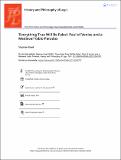Files in this item
'Everything true will be false' : Paul of Venice and a Medieval Yablo paradox
Item metadata
| dc.contributor.author | Read, Stephen | |
| dc.date.accessioned | 2022-04-22T14:30:54Z | |
| dc.date.available | 2022-04-22T14:30:54Z | |
| dc.date.issued | 2022 | |
| dc.identifier | 277262095 | |
| dc.identifier | 4bd2e219-ab0b-4703-b302-703148947a2a | |
| dc.identifier | 85127367446 | |
| dc.identifier | 000773873900001 | |
| dc.identifier.citation | Read , S 2022 , ' 'Everything true will be false' : Paul of Venice and a Medieval Yablo paradox ' , History and Philosophy of Logic , vol. 43 , no. 4 , 2 , pp. 332-346 . https://doi.org/10.1080/01445340.2022.2040797 | en |
| dc.identifier.issn | 0144-5340 | |
| dc.identifier.other | ORCID: /0000-0003-2181-2609/work/110911931 | |
| dc.identifier.uri | https://hdl.handle.net/10023/25236 | |
| dc.description.abstract | In his Quadratura, Paul of Venice considers a sophism involving time and tense which appears to show that there is a valid inference which is also invalid. Consider this inference concerning some proposition A: A will signify only that everything true will be false, so A will be false. Call this inference B. Then B is valid because the opposite of its conclusion is incompatible with its premise. But he proceeds to argue that it is possible that B's premise could be true and its conclusion false, so B is not only valid but also invalid. Thus A and B are the basis of an insoluble---that is, a Liar-like paradox. Like the sequence of statements in Yablo's paradox, B looks ahead to a moment when A will be false, yet that moment may never come. In his Logica Parva, Paul follows the solution to insolubles found in the collection of elementary treatises known as the Logica Oxoniensis, which posits an implicit assertion of its own truth in insolubles like B. However, in the treatise on insolubles in his Logica Magna, Paul develops and endorses a different solution that takes insolubles at face value, meaning no more than is explicit in what they say. On this account, insolubles imply their own falsity, and that is why, in so falsifying themselves, they are false. We consider how both types of solution apply to A and B: on both, B is valid. But on one, B has true premises and false conclusion, and contradictories can be false together; on the other (following the Logica Oxoniensis), the counterexample is rejected. | |
| dc.format.extent | 15 | |
| dc.format.extent | 1635106 | |
| dc.language.iso | eng | |
| dc.relation.ispartof | History and Philosophy of Logic | en |
| dc.subject | Paradox | en |
| dc.subject | Insolubles | en |
| dc.subject | Multiple-meanings | en |
| dc.subject | Self-falsification | en |
| dc.subject | Yablo's paradox | en |
| dc.subject | Heytesbury | en |
| dc.subject | Swyneshed | en |
| dc.subject | Paul of Venice | en |
| dc.subject | BC Logic | en |
| dc.subject | Arts and Humanities(all) | en |
| dc.subject | T-NDAS | en |
| dc.subject | NIS | en |
| dc.subject | MCC | en |
| dc.subject.lcc | BC | en |
| dc.title | 'Everything true will be false' : Paul of Venice and a Medieval Yablo paradox | en |
| dc.type | Journal article | en |
| dc.contributor.sponsor | The Leverhulme Trust | en |
| dc.contributor.institution | University of St Andrews. Arché Philosophical Research Centre for Logic, Language, Metaphysics and Epistemology | en |
| dc.contributor.institution | University of St Andrews. St Andrews Institute of Medieval Studies | en |
| dc.contributor.institution | University of St Andrews. Philosophy | en |
| dc.identifier.doi | 10.1080/01445340.2022.2040797 | |
| dc.description.status | Peer reviewed | en |
| dc.identifier.grantnumber | RPG-2016-333 | en |
This item appears in the following Collection(s)
Items in the St Andrews Research Repository are protected by copyright, with all rights reserved, unless otherwise indicated.

